Exploring the Lifeworld of an Entrepreneur in the 21st Century
VerifiedAdded on 2023/04/07
|13
|3540
|158
Report
AI Summary
This report delves into the lifeworld of an entrepreneur, exploring the pressures and complexities associated with running a small business in the 21st century. It critically evaluates the skills and competencies needed for success, drawing upon economic, resource-based, psychological, sociological, and opportunity-based theories of entrepreneurship. The report examines the position of SMEs within the economy and the trends impacting business ventures, including the rise of freelance workers, blockchain technology, social shopping, and intelligent applications. A critical appraisal of SME operations covers marketing, finance, supply chain management, and human resources, highlighting the importance of team building and relationships for fostering a creative culture. The research is informed by an interview with the CEO of Blueberry's, providing practical insights into the challenges and strategies of entrepreneurship.

Personal research project
Paraphrase This Document
Need a fresh take? Get an instant paraphrase of this document with our AI Paraphraser
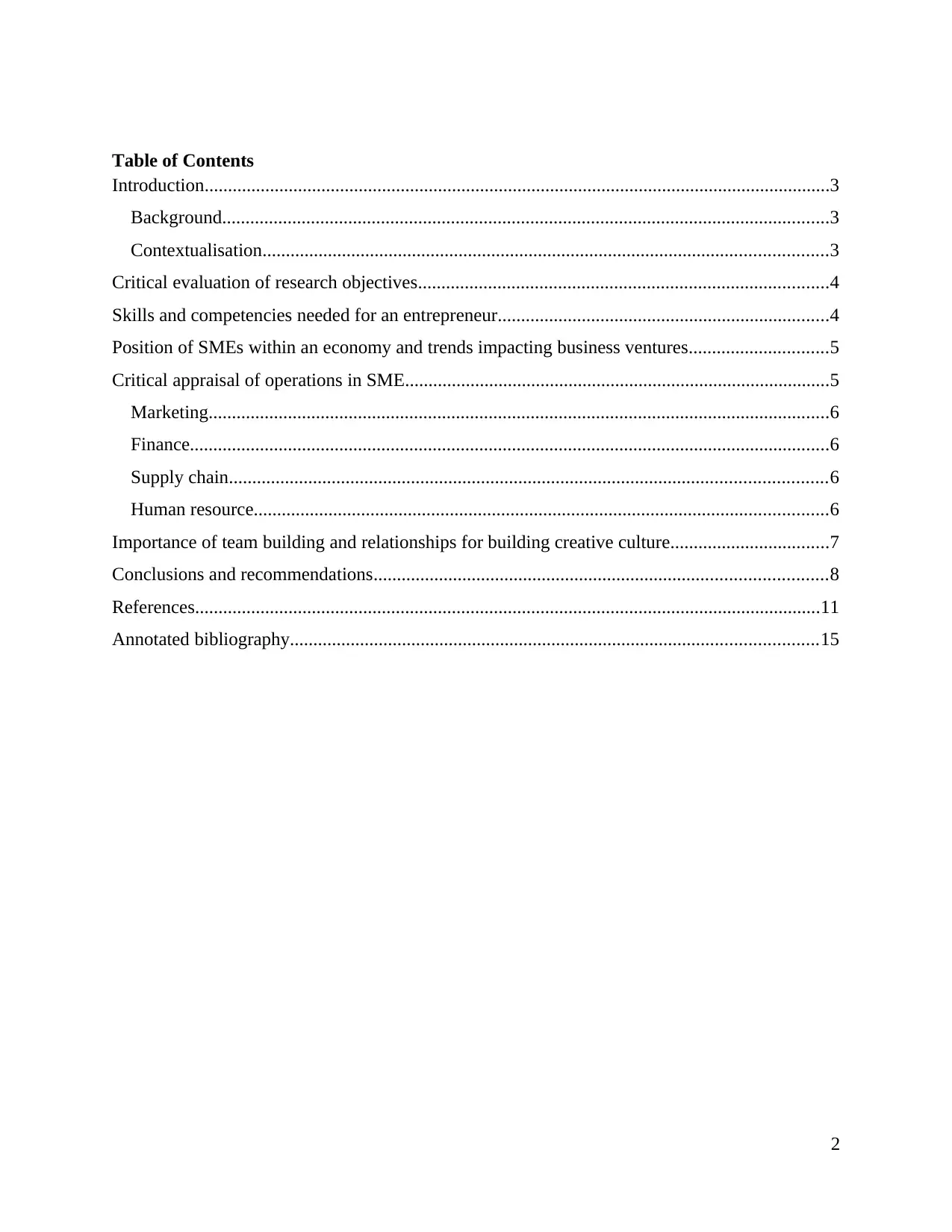
Table of Contents
Introduction......................................................................................................................................3
Background..................................................................................................................................3
Contextualisation.........................................................................................................................3
Critical evaluation of research objectives........................................................................................4
Skills and competencies needed for an entrepreneur.......................................................................4
Position of SMEs within an economy and trends impacting business ventures..............................5
Critical appraisal of operations in SME...........................................................................................5
Marketing.....................................................................................................................................6
Finance.........................................................................................................................................6
Supply chain................................................................................................................................6
Human resource...........................................................................................................................6
Importance of team building and relationships for building creative culture..................................7
Conclusions and recommendations.................................................................................................8
References......................................................................................................................................11
Annotated bibliography.................................................................................................................15
2
Introduction......................................................................................................................................3
Background..................................................................................................................................3
Contextualisation.........................................................................................................................3
Critical evaluation of research objectives........................................................................................4
Skills and competencies needed for an entrepreneur.......................................................................4
Position of SMEs within an economy and trends impacting business ventures..............................5
Critical appraisal of operations in SME...........................................................................................5
Marketing.....................................................................................................................................6
Finance.........................................................................................................................................6
Supply chain................................................................................................................................6
Human resource...........................................................................................................................6
Importance of team building and relationships for building creative culture..................................7
Conclusions and recommendations.................................................................................................8
References......................................................................................................................................11
Annotated bibliography.................................................................................................................15
2
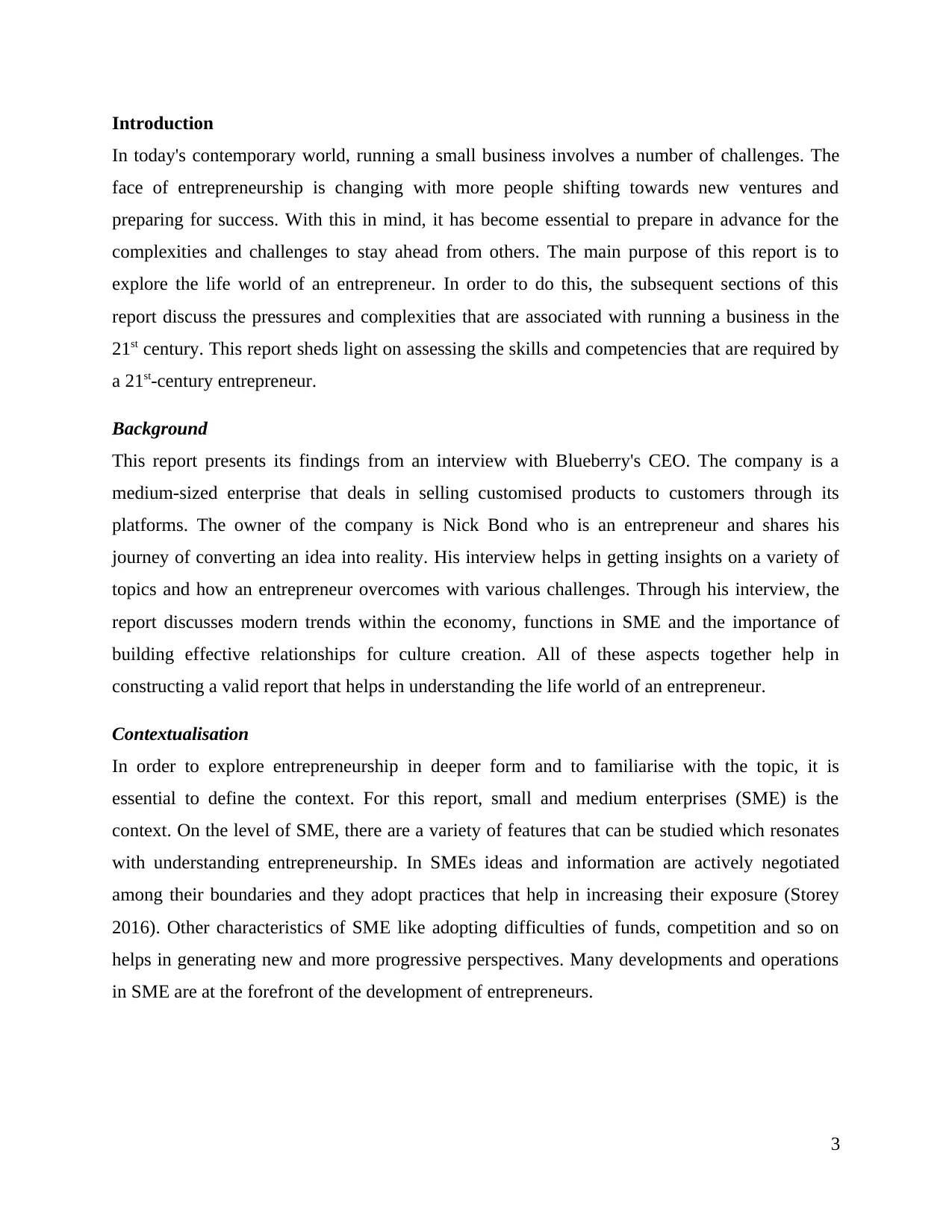
Introduction
In today's contemporary world, running a small business involves a number of challenges. The
face of entrepreneurship is changing with more people shifting towards new ventures and
preparing for success. With this in mind, it has become essential to prepare in advance for the
complexities and challenges to stay ahead from others. The main purpose of this report is to
explore the life world of an entrepreneur. In order to do this, the subsequent sections of this
report discuss the pressures and complexities that are associated with running a business in the
21st century. This report sheds light on assessing the skills and competencies that are required by
a 21st-century entrepreneur.
Background
This report presents its findings from an interview with Blueberry's CEO. The company is a
medium-sized enterprise that deals in selling customised products to customers through its
platforms. The owner of the company is Nick Bond who is an entrepreneur and shares his
journey of converting an idea into reality. His interview helps in getting insights on a variety of
topics and how an entrepreneur overcomes with various challenges. Through his interview, the
report discusses modern trends within the economy, functions in SME and the importance of
building effective relationships for culture creation. All of these aspects together help in
constructing a valid report that helps in understanding the life world of an entrepreneur.
Contextualisation
In order to explore entrepreneurship in deeper form and to familiarise with the topic, it is
essential to define the context. For this report, small and medium enterprises (SME) is the
context. On the level of SME, there are a variety of features that can be studied which resonates
with understanding entrepreneurship. In SMEs ideas and information are actively negotiated
among their boundaries and they adopt practices that help in increasing their exposure (Storey
2016). Other characteristics of SME like adopting difficulties of funds, competition and so on
helps in generating new and more progressive perspectives. Many developments and operations
in SME are at the forefront of the development of entrepreneurs.
3
In today's contemporary world, running a small business involves a number of challenges. The
face of entrepreneurship is changing with more people shifting towards new ventures and
preparing for success. With this in mind, it has become essential to prepare in advance for the
complexities and challenges to stay ahead from others. The main purpose of this report is to
explore the life world of an entrepreneur. In order to do this, the subsequent sections of this
report discuss the pressures and complexities that are associated with running a business in the
21st century. This report sheds light on assessing the skills and competencies that are required by
a 21st-century entrepreneur.
Background
This report presents its findings from an interview with Blueberry's CEO. The company is a
medium-sized enterprise that deals in selling customised products to customers through its
platforms. The owner of the company is Nick Bond who is an entrepreneur and shares his
journey of converting an idea into reality. His interview helps in getting insights on a variety of
topics and how an entrepreneur overcomes with various challenges. Through his interview, the
report discusses modern trends within the economy, functions in SME and the importance of
building effective relationships for culture creation. All of these aspects together help in
constructing a valid report that helps in understanding the life world of an entrepreneur.
Contextualisation
In order to explore entrepreneurship in deeper form and to familiarise with the topic, it is
essential to define the context. For this report, small and medium enterprises (SME) is the
context. On the level of SME, there are a variety of features that can be studied which resonates
with understanding entrepreneurship. In SMEs ideas and information are actively negotiated
among their boundaries and they adopt practices that help in increasing their exposure (Storey
2016). Other characteristics of SME like adopting difficulties of funds, competition and so on
helps in generating new and more progressive perspectives. Many developments and operations
in SME are at the forefront of the development of entrepreneurs.
3
⊘ This is a preview!⊘
Do you want full access?
Subscribe today to unlock all pages.

Trusted by 1+ million students worldwide
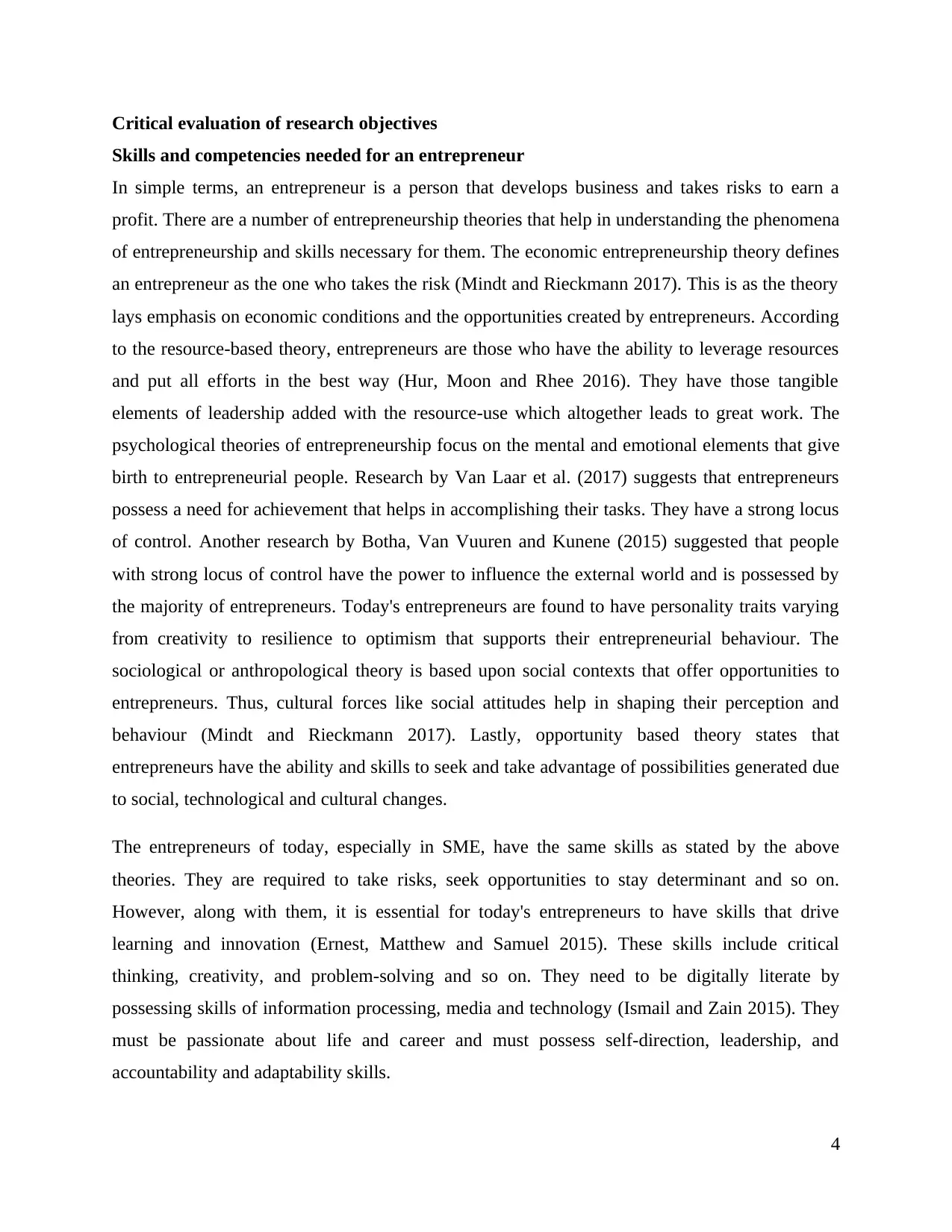
Critical evaluation of research objectives
Skills and competencies needed for an entrepreneur
In simple terms, an entrepreneur is a person that develops business and takes risks to earn a
profit. There are a number of entrepreneurship theories that help in understanding the phenomena
of entrepreneurship and skills necessary for them. The economic entrepreneurship theory defines
an entrepreneur as the one who takes the risk (Mindt and Rieckmann 2017). This is as the theory
lays emphasis on economic conditions and the opportunities created by entrepreneurs. According
to the resource-based theory, entrepreneurs are those who have the ability to leverage resources
and put all efforts in the best way (Hur, Moon and Rhee 2016). They have those tangible
elements of leadership added with the resource-use which altogether leads to great work. The
psychological theories of entrepreneurship focus on the mental and emotional elements that give
birth to entrepreneurial people. Research by Van Laar et al. (2017) suggests that entrepreneurs
possess a need for achievement that helps in accomplishing their tasks. They have a strong locus
of control. Another research by Botha, Van Vuuren and Kunene (2015) suggested that people
with strong locus of control have the power to influence the external world and is possessed by
the majority of entrepreneurs. Today's entrepreneurs are found to have personality traits varying
from creativity to resilience to optimism that supports their entrepreneurial behaviour. The
sociological or anthropological theory is based upon social contexts that offer opportunities to
entrepreneurs. Thus, cultural forces like social attitudes help in shaping their perception and
behaviour (Mindt and Rieckmann 2017). Lastly, opportunity based theory states that
entrepreneurs have the ability and skills to seek and take advantage of possibilities generated due
to social, technological and cultural changes.
The entrepreneurs of today, especially in SME, have the same skills as stated by the above
theories. They are required to take risks, seek opportunities to stay determinant and so on.
However, along with them, it is essential for today's entrepreneurs to have skills that drive
learning and innovation (Ernest, Matthew and Samuel 2015). These skills include critical
thinking, creativity, and problem-solving and so on. They need to be digitally literate by
possessing skills of information processing, media and technology (Ismail and Zain 2015). They
must be passionate about life and career and must possess self-direction, leadership, and
accountability and adaptability skills.
4
Skills and competencies needed for an entrepreneur
In simple terms, an entrepreneur is a person that develops business and takes risks to earn a
profit. There are a number of entrepreneurship theories that help in understanding the phenomena
of entrepreneurship and skills necessary for them. The economic entrepreneurship theory defines
an entrepreneur as the one who takes the risk (Mindt and Rieckmann 2017). This is as the theory
lays emphasis on economic conditions and the opportunities created by entrepreneurs. According
to the resource-based theory, entrepreneurs are those who have the ability to leverage resources
and put all efforts in the best way (Hur, Moon and Rhee 2016). They have those tangible
elements of leadership added with the resource-use which altogether leads to great work. The
psychological theories of entrepreneurship focus on the mental and emotional elements that give
birth to entrepreneurial people. Research by Van Laar et al. (2017) suggests that entrepreneurs
possess a need for achievement that helps in accomplishing their tasks. They have a strong locus
of control. Another research by Botha, Van Vuuren and Kunene (2015) suggested that people
with strong locus of control have the power to influence the external world and is possessed by
the majority of entrepreneurs. Today's entrepreneurs are found to have personality traits varying
from creativity to resilience to optimism that supports their entrepreneurial behaviour. The
sociological or anthropological theory is based upon social contexts that offer opportunities to
entrepreneurs. Thus, cultural forces like social attitudes help in shaping their perception and
behaviour (Mindt and Rieckmann 2017). Lastly, opportunity based theory states that
entrepreneurs have the ability and skills to seek and take advantage of possibilities generated due
to social, technological and cultural changes.
The entrepreneurs of today, especially in SME, have the same skills as stated by the above
theories. They are required to take risks, seek opportunities to stay determinant and so on.
However, along with them, it is essential for today's entrepreneurs to have skills that drive
learning and innovation (Ernest, Matthew and Samuel 2015). These skills include critical
thinking, creativity, and problem-solving and so on. They need to be digitally literate by
possessing skills of information processing, media and technology (Ismail and Zain 2015). They
must be passionate about life and career and must possess self-direction, leadership, and
accountability and adaptability skills.
4
Paraphrase This Document
Need a fresh take? Get an instant paraphrase of this document with our AI Paraphraser
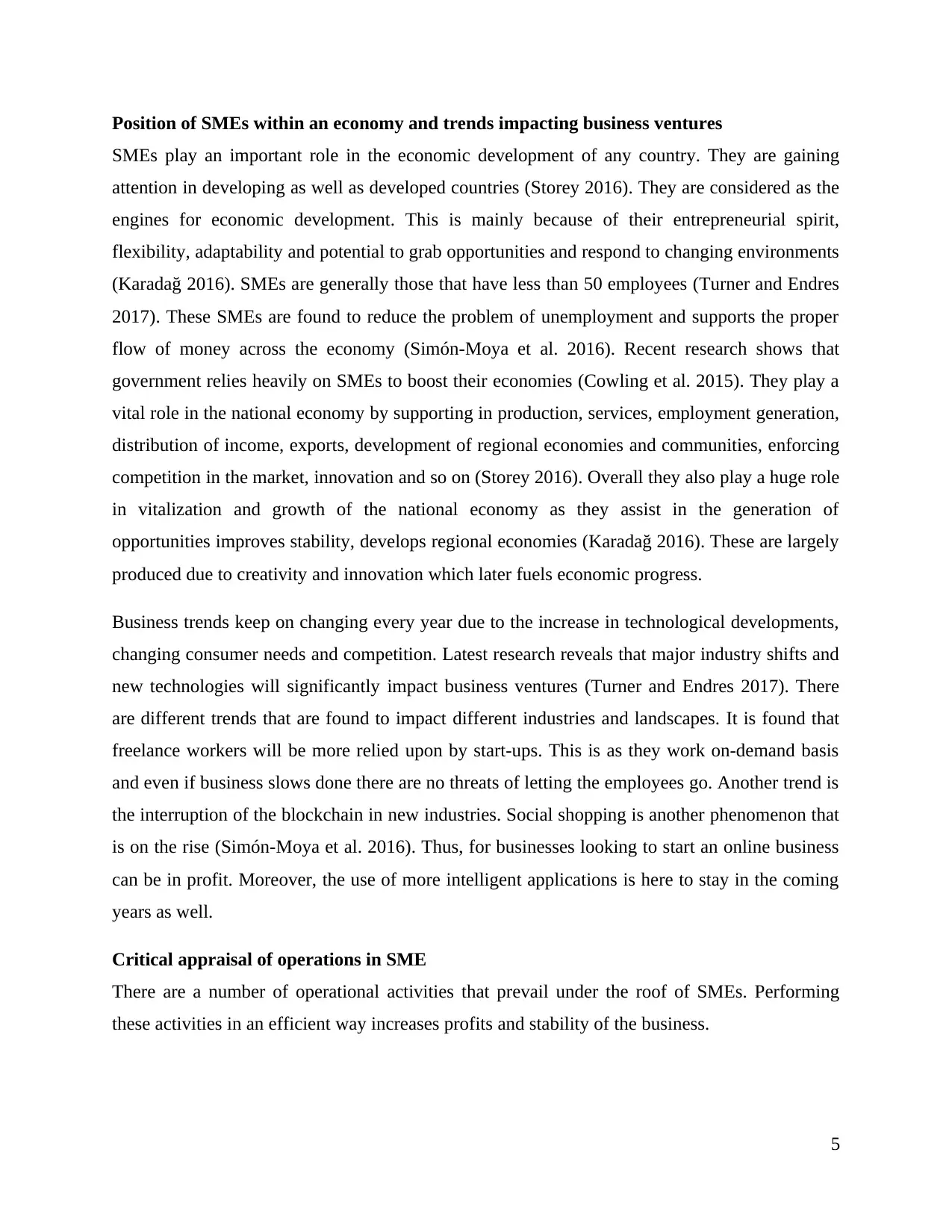
Position of SMEs within an economy and trends impacting business ventures
SMEs play an important role in the economic development of any country. They are gaining
attention in developing as well as developed countries (Storey 2016). They are considered as the
engines for economic development. This is mainly because of their entrepreneurial spirit,
flexibility, adaptability and potential to grab opportunities and respond to changing environments
(Karadağ 2016). SMEs are generally those that have less than 50 employees (Turner and Endres
2017). These SMEs are found to reduce the problem of unemployment and supports the proper
flow of money across the economy (Simón-Moya et al. 2016). Recent research shows that
government relies heavily on SMEs to boost their economies (Cowling et al. 2015). They play a
vital role in the national economy by supporting in production, services, employment generation,
distribution of income, exports, development of regional economies and communities, enforcing
competition in the market, innovation and so on (Storey 2016). Overall they also play a huge role
in vitalization and growth of the national economy as they assist in the generation of
opportunities improves stability, develops regional economies (Karadağ 2016). These are largely
produced due to creativity and innovation which later fuels economic progress.
Business trends keep on changing every year due to the increase in technological developments,
changing consumer needs and competition. Latest research reveals that major industry shifts and
new technologies will significantly impact business ventures (Turner and Endres 2017). There
are different trends that are found to impact different industries and landscapes. It is found that
freelance workers will be more relied upon by start-ups. This is as they work on-demand basis
and even if business slows done there are no threats of letting the employees go. Another trend is
the interruption of the blockchain in new industries. Social shopping is another phenomenon that
is on the rise (Simón-Moya et al. 2016). Thus, for businesses looking to start an online business
can be in profit. Moreover, the use of more intelligent applications is here to stay in the coming
years as well.
Critical appraisal of operations in SME
There are a number of operational activities that prevail under the roof of SMEs. Performing
these activities in an efficient way increases profits and stability of the business.
5
SMEs play an important role in the economic development of any country. They are gaining
attention in developing as well as developed countries (Storey 2016). They are considered as the
engines for economic development. This is mainly because of their entrepreneurial spirit,
flexibility, adaptability and potential to grab opportunities and respond to changing environments
(Karadağ 2016). SMEs are generally those that have less than 50 employees (Turner and Endres
2017). These SMEs are found to reduce the problem of unemployment and supports the proper
flow of money across the economy (Simón-Moya et al. 2016). Recent research shows that
government relies heavily on SMEs to boost their economies (Cowling et al. 2015). They play a
vital role in the national economy by supporting in production, services, employment generation,
distribution of income, exports, development of regional economies and communities, enforcing
competition in the market, innovation and so on (Storey 2016). Overall they also play a huge role
in vitalization and growth of the national economy as they assist in the generation of
opportunities improves stability, develops regional economies (Karadağ 2016). These are largely
produced due to creativity and innovation which later fuels economic progress.
Business trends keep on changing every year due to the increase in technological developments,
changing consumer needs and competition. Latest research reveals that major industry shifts and
new technologies will significantly impact business ventures (Turner and Endres 2017). There
are different trends that are found to impact different industries and landscapes. It is found that
freelance workers will be more relied upon by start-ups. This is as they work on-demand basis
and even if business slows done there are no threats of letting the employees go. Another trend is
the interruption of the blockchain in new industries. Social shopping is another phenomenon that
is on the rise (Simón-Moya et al. 2016). Thus, for businesses looking to start an online business
can be in profit. Moreover, the use of more intelligent applications is here to stay in the coming
years as well.
Critical appraisal of operations in SME
There are a number of operational activities that prevail under the roof of SMEs. Performing
these activities in an efficient way increases profits and stability of the business.
5
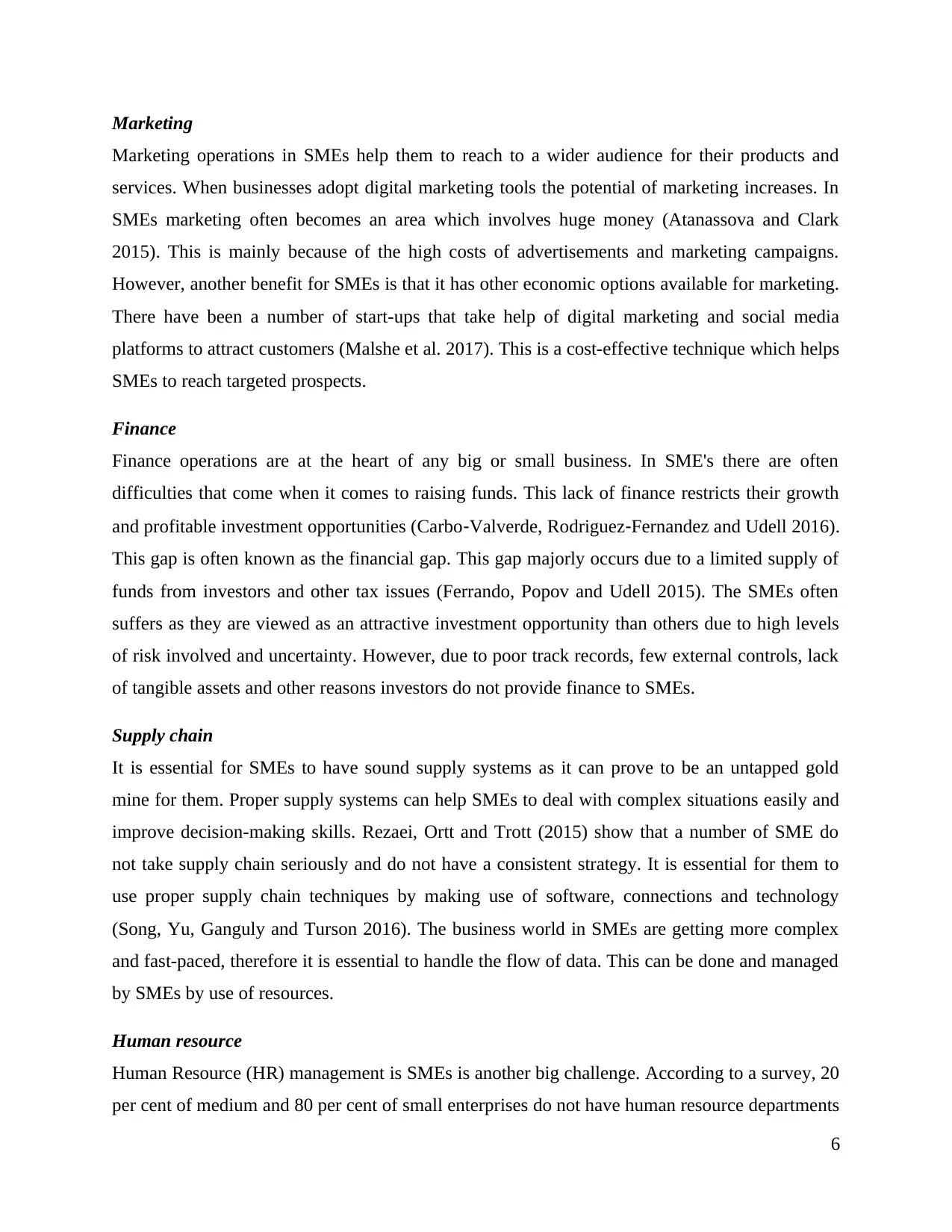
Marketing
Marketing operations in SMEs help them to reach to a wider audience for their products and
services. When businesses adopt digital marketing tools the potential of marketing increases. In
SMEs marketing often becomes an area which involves huge money (Atanassova and Clark
2015). This is mainly because of the high costs of advertisements and marketing campaigns.
However, another benefit for SMEs is that it has other economic options available for marketing.
There have been a number of start-ups that take help of digital marketing and social media
platforms to attract customers (Malshe et al. 2017). This is a cost-effective technique which helps
SMEs to reach targeted prospects.
Finance
Finance operations are at the heart of any big or small business. In SME's there are often
difficulties that come when it comes to raising funds. This lack of finance restricts their growth
and profitable investment opportunities (Carbo‐Valverde, Rodriguez‐Fernandez and Udell 2016).
This gap is often known as the financial gap. This gap majorly occurs due to a limited supply of
funds from investors and other tax issues (Ferrando, Popov and Udell 2015). The SMEs often
suffers as they are viewed as an attractive investment opportunity than others due to high levels
of risk involved and uncertainty. However, due to poor track records, few external controls, lack
of tangible assets and other reasons investors do not provide finance to SMEs.
Supply chain
It is essential for SMEs to have sound supply systems as it can prove to be an untapped gold
mine for them. Proper supply systems can help SMEs to deal with complex situations easily and
improve decision-making skills. Rezaei, Ortt and Trott (2015) show that a number of SME do
not take supply chain seriously and do not have a consistent strategy. It is essential for them to
use proper supply chain techniques by making use of software, connections and technology
(Song, Yu, Ganguly and Turson 2016). The business world in SMEs are getting more complex
and fast-paced, therefore it is essential to handle the flow of data. This can be done and managed
by SMEs by use of resources.
Human resource
Human Resource (HR) management is SMEs is another big challenge. According to a survey, 20
per cent of medium and 80 per cent of small enterprises do not have human resource departments
6
Marketing operations in SMEs help them to reach to a wider audience for their products and
services. When businesses adopt digital marketing tools the potential of marketing increases. In
SMEs marketing often becomes an area which involves huge money (Atanassova and Clark
2015). This is mainly because of the high costs of advertisements and marketing campaigns.
However, another benefit for SMEs is that it has other economic options available for marketing.
There have been a number of start-ups that take help of digital marketing and social media
platforms to attract customers (Malshe et al. 2017). This is a cost-effective technique which helps
SMEs to reach targeted prospects.
Finance
Finance operations are at the heart of any big or small business. In SME's there are often
difficulties that come when it comes to raising funds. This lack of finance restricts their growth
and profitable investment opportunities (Carbo‐Valverde, Rodriguez‐Fernandez and Udell 2016).
This gap is often known as the financial gap. This gap majorly occurs due to a limited supply of
funds from investors and other tax issues (Ferrando, Popov and Udell 2015). The SMEs often
suffers as they are viewed as an attractive investment opportunity than others due to high levels
of risk involved and uncertainty. However, due to poor track records, few external controls, lack
of tangible assets and other reasons investors do not provide finance to SMEs.
Supply chain
It is essential for SMEs to have sound supply systems as it can prove to be an untapped gold
mine for them. Proper supply systems can help SMEs to deal with complex situations easily and
improve decision-making skills. Rezaei, Ortt and Trott (2015) show that a number of SME do
not take supply chain seriously and do not have a consistent strategy. It is essential for them to
use proper supply chain techniques by making use of software, connections and technology
(Song, Yu, Ganguly and Turson 2016). The business world in SMEs are getting more complex
and fast-paced, therefore it is essential to handle the flow of data. This can be done and managed
by SMEs by use of resources.
Human resource
Human Resource (HR) management is SMEs is another big challenge. According to a survey, 20
per cent of medium and 80 per cent of small enterprises do not have human resource departments
6
⊘ This is a preview!⊘
Do you want full access?
Subscribe today to unlock all pages.

Trusted by 1+ million students worldwide
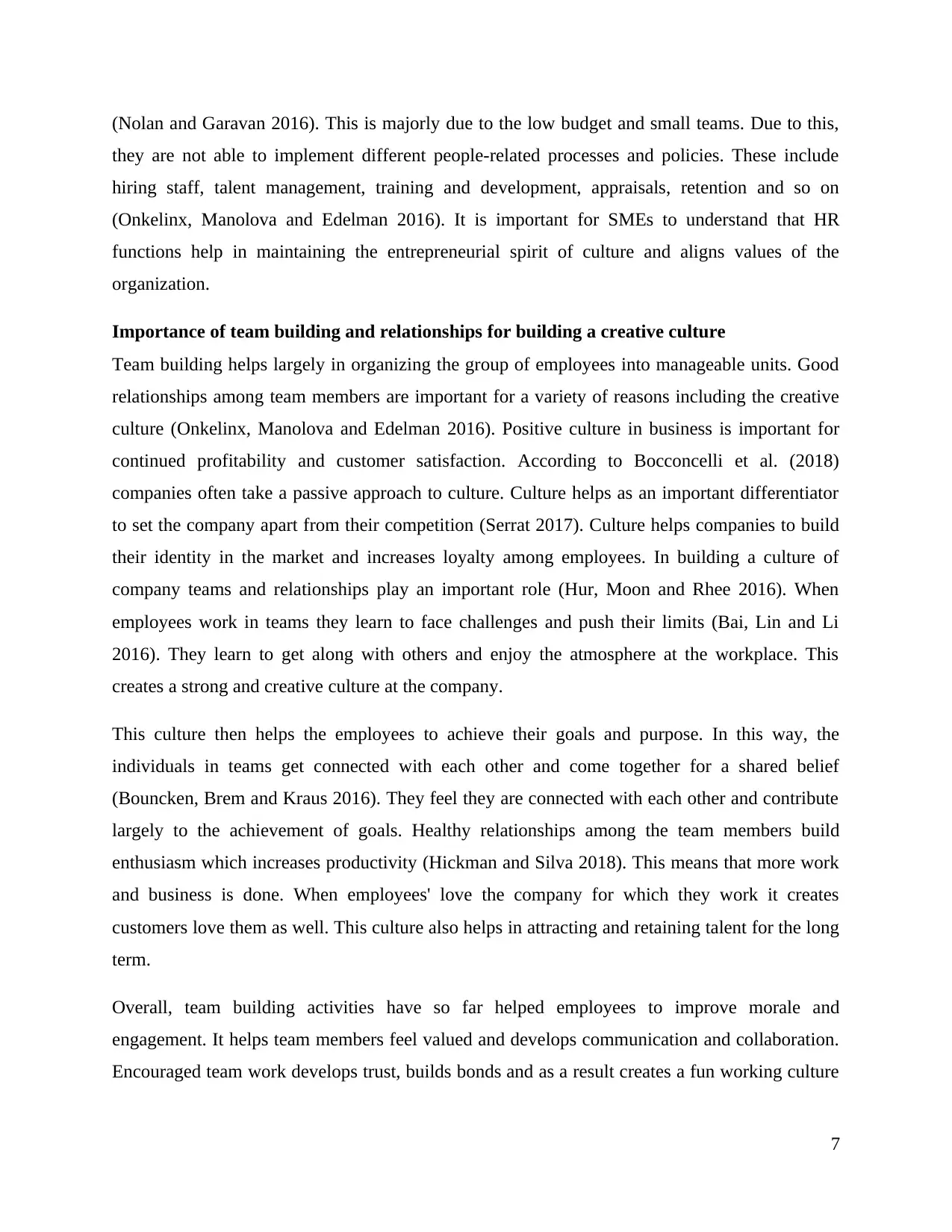
(Nolan and Garavan 2016). This is majorly due to the low budget and small teams. Due to this,
they are not able to implement different people-related processes and policies. These include
hiring staff, talent management, training and development, appraisals, retention and so on
(Onkelinx, Manolova and Edelman 2016). It is important for SMEs to understand that HR
functions help in maintaining the entrepreneurial spirit of culture and aligns values of the
organization.
Importance of team building and relationships for building a creative culture
Team building helps largely in organizing the group of employees into manageable units. Good
relationships among team members are important for a variety of reasons including the creative
culture (Onkelinx, Manolova and Edelman 2016). Positive culture in business is important for
continued profitability and customer satisfaction. According to Bocconcelli et al. (2018)
companies often take a passive approach to culture. Culture helps as an important differentiator
to set the company apart from their competition (Serrat 2017). Culture helps companies to build
their identity in the market and increases loyalty among employees. In building a culture of
company teams and relationships play an important role (Hur, Moon and Rhee 2016). When
employees work in teams they learn to face challenges and push their limits (Bai, Lin and Li
2016). They learn to get along with others and enjoy the atmosphere at the workplace. This
creates a strong and creative culture at the company.
This culture then helps the employees to achieve their goals and purpose. In this way, the
individuals in teams get connected with each other and come together for a shared belief
(Bouncken, Brem and Kraus 2016). They feel they are connected with each other and contribute
largely to the achievement of goals. Healthy relationships among the team members build
enthusiasm which increases productivity (Hickman and Silva 2018). This means that more work
and business is done. When employees' love the company for which they work it creates
customers love them as well. This culture also helps in attracting and retaining talent for the long
term.
Overall, team building activities have so far helped employees to improve morale and
engagement. It helps team members feel valued and develops communication and collaboration.
Encouraged team work develops trust, builds bonds and as a result creates a fun working culture
7
they are not able to implement different people-related processes and policies. These include
hiring staff, talent management, training and development, appraisals, retention and so on
(Onkelinx, Manolova and Edelman 2016). It is important for SMEs to understand that HR
functions help in maintaining the entrepreneurial spirit of culture and aligns values of the
organization.
Importance of team building and relationships for building a creative culture
Team building helps largely in organizing the group of employees into manageable units. Good
relationships among team members are important for a variety of reasons including the creative
culture (Onkelinx, Manolova and Edelman 2016). Positive culture in business is important for
continued profitability and customer satisfaction. According to Bocconcelli et al. (2018)
companies often take a passive approach to culture. Culture helps as an important differentiator
to set the company apart from their competition (Serrat 2017). Culture helps companies to build
their identity in the market and increases loyalty among employees. In building a culture of
company teams and relationships play an important role (Hur, Moon and Rhee 2016). When
employees work in teams they learn to face challenges and push their limits (Bai, Lin and Li
2016). They learn to get along with others and enjoy the atmosphere at the workplace. This
creates a strong and creative culture at the company.
This culture then helps the employees to achieve their goals and purpose. In this way, the
individuals in teams get connected with each other and come together for a shared belief
(Bouncken, Brem and Kraus 2016). They feel they are connected with each other and contribute
largely to the achievement of goals. Healthy relationships among the team members build
enthusiasm which increases productivity (Hickman and Silva 2018). This means that more work
and business is done. When employees' love the company for which they work it creates
customers love them as well. This culture also helps in attracting and retaining talent for the long
term.
Overall, team building activities have so far helped employees to improve morale and
engagement. It helps team members feel valued and develops communication and collaboration.
Encouraged team work develops trust, builds bonds and as a result creates a fun working culture
7
Paraphrase This Document
Need a fresh take? Get an instant paraphrase of this document with our AI Paraphraser
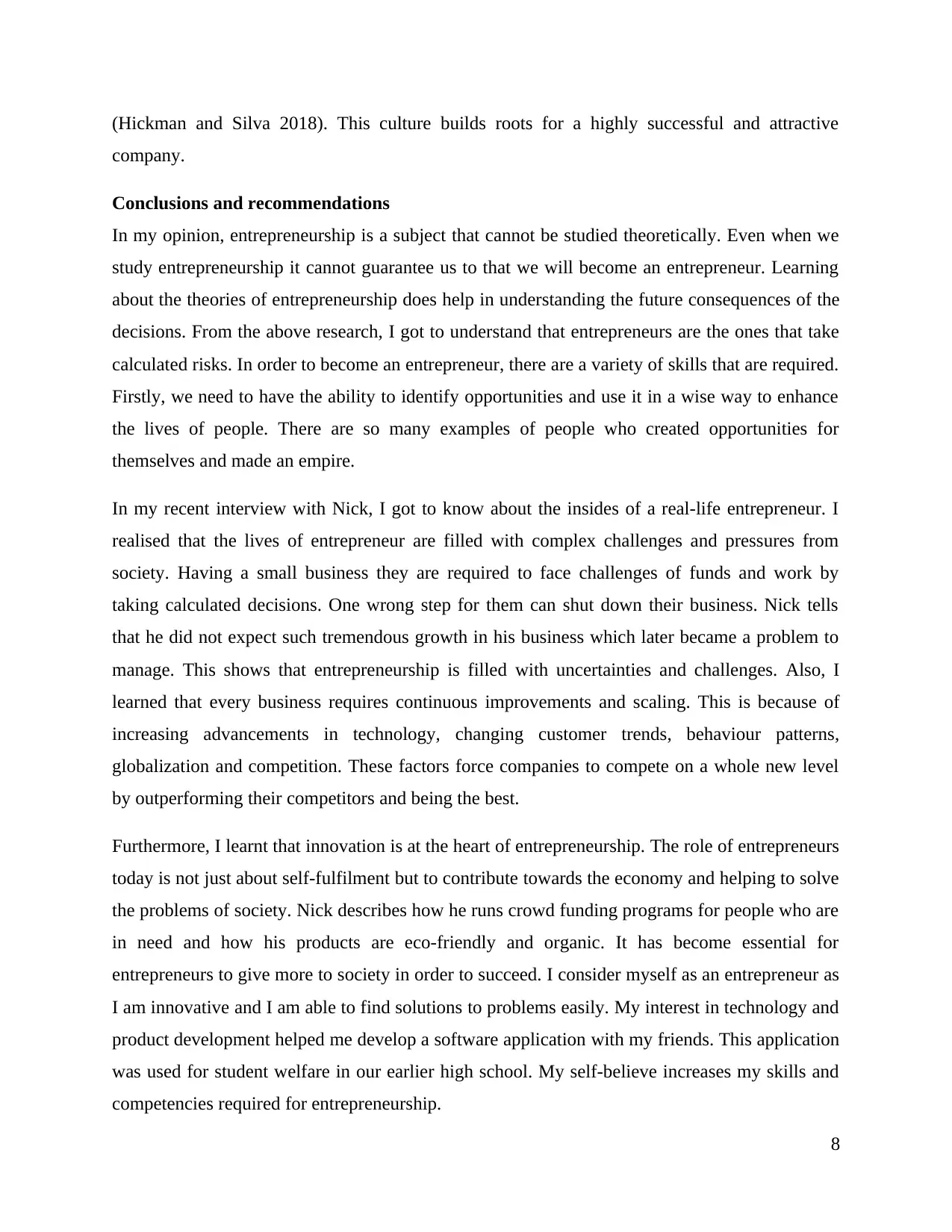
(Hickman and Silva 2018). This culture builds roots for a highly successful and attractive
company.
Conclusions and recommendations
In my opinion, entrepreneurship is a subject that cannot be studied theoretically. Even when we
study entrepreneurship it cannot guarantee us to that we will become an entrepreneur. Learning
about the theories of entrepreneurship does help in understanding the future consequences of the
decisions. From the above research, I got to understand that entrepreneurs are the ones that take
calculated risks. In order to become an entrepreneur, there are a variety of skills that are required.
Firstly, we need to have the ability to identify opportunities and use it in a wise way to enhance
the lives of people. There are so many examples of people who created opportunities for
themselves and made an empire.
In my recent interview with Nick, I got to know about the insides of a real-life entrepreneur. I
realised that the lives of entrepreneur are filled with complex challenges and pressures from
society. Having a small business they are required to face challenges of funds and work by
taking calculated decisions. One wrong step for them can shut down their business. Nick tells
that he did not expect such tremendous growth in his business which later became a problem to
manage. This shows that entrepreneurship is filled with uncertainties and challenges. Also, I
learned that every business requires continuous improvements and scaling. This is because of
increasing advancements in technology, changing customer trends, behaviour patterns,
globalization and competition. These factors force companies to compete on a whole new level
by outperforming their competitors and being the best.
Furthermore, I learnt that innovation is at the heart of entrepreneurship. The role of entrepreneurs
today is not just about self-fulfilment but to contribute towards the economy and helping to solve
the problems of society. Nick describes how he runs crowd funding programs for people who are
in need and how his products are eco-friendly and organic. It has become essential for
entrepreneurs to give more to society in order to succeed. I consider myself as an entrepreneur as
I am innovative and I am able to find solutions to problems easily. My interest in technology and
product development helped me develop a software application with my friends. This application
was used for student welfare in our earlier high school. My self-believe increases my skills and
competencies required for entrepreneurship.
8
company.
Conclusions and recommendations
In my opinion, entrepreneurship is a subject that cannot be studied theoretically. Even when we
study entrepreneurship it cannot guarantee us to that we will become an entrepreneur. Learning
about the theories of entrepreneurship does help in understanding the future consequences of the
decisions. From the above research, I got to understand that entrepreneurs are the ones that take
calculated risks. In order to become an entrepreneur, there are a variety of skills that are required.
Firstly, we need to have the ability to identify opportunities and use it in a wise way to enhance
the lives of people. There are so many examples of people who created opportunities for
themselves and made an empire.
In my recent interview with Nick, I got to know about the insides of a real-life entrepreneur. I
realised that the lives of entrepreneur are filled with complex challenges and pressures from
society. Having a small business they are required to face challenges of funds and work by
taking calculated decisions. One wrong step for them can shut down their business. Nick tells
that he did not expect such tremendous growth in his business which later became a problem to
manage. This shows that entrepreneurship is filled with uncertainties and challenges. Also, I
learned that every business requires continuous improvements and scaling. This is because of
increasing advancements in technology, changing customer trends, behaviour patterns,
globalization and competition. These factors force companies to compete on a whole new level
by outperforming their competitors and being the best.
Furthermore, I learnt that innovation is at the heart of entrepreneurship. The role of entrepreneurs
today is not just about self-fulfilment but to contribute towards the economy and helping to solve
the problems of society. Nick describes how he runs crowd funding programs for people who are
in need and how his products are eco-friendly and organic. It has become essential for
entrepreneurs to give more to society in order to succeed. I consider myself as an entrepreneur as
I am innovative and I am able to find solutions to problems easily. My interest in technology and
product development helped me develop a software application with my friends. This application
was used for student welfare in our earlier high school. My self-believe increases my skills and
competencies required for entrepreneurship.
8
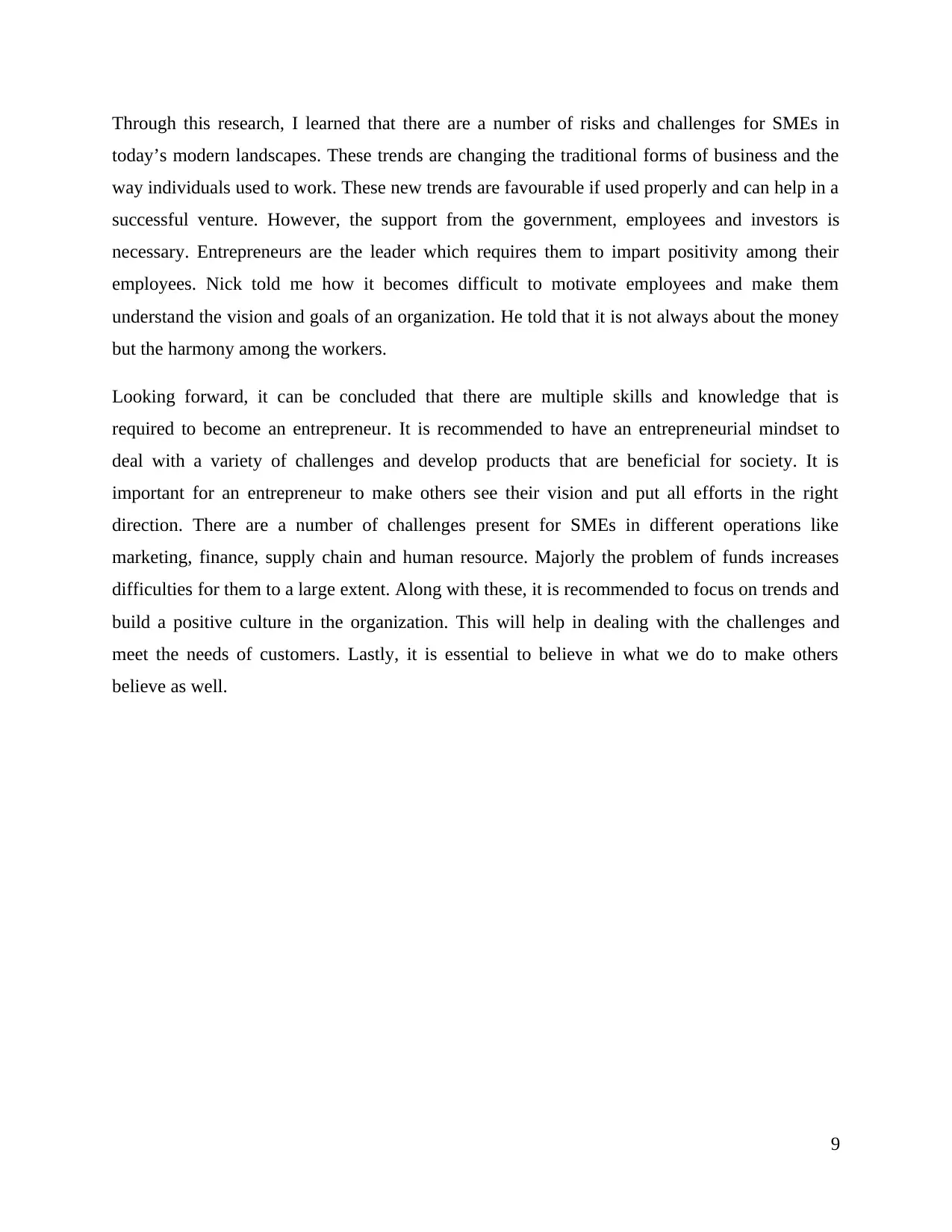
Through this research, I learned that there are a number of risks and challenges for SMEs in
today’s modern landscapes. These trends are changing the traditional forms of business and the
way individuals used to work. These new trends are favourable if used properly and can help in a
successful venture. However, the support from the government, employees and investors is
necessary. Entrepreneurs are the leader which requires them to impart positivity among their
employees. Nick told me how it becomes difficult to motivate employees and make them
understand the vision and goals of an organization. He told that it is not always about the money
but the harmony among the workers.
Looking forward, it can be concluded that there are multiple skills and knowledge that is
required to become an entrepreneur. It is recommended to have an entrepreneurial mindset to
deal with a variety of challenges and develop products that are beneficial for society. It is
important for an entrepreneur to make others see their vision and put all efforts in the right
direction. There are a number of challenges present for SMEs in different operations like
marketing, finance, supply chain and human resource. Majorly the problem of funds increases
difficulties for them to a large extent. Along with these, it is recommended to focus on trends and
build a positive culture in the organization. This will help in dealing with the challenges and
meet the needs of customers. Lastly, it is essential to believe in what we do to make others
believe as well.
9
today’s modern landscapes. These trends are changing the traditional forms of business and the
way individuals used to work. These new trends are favourable if used properly and can help in a
successful venture. However, the support from the government, employees and investors is
necessary. Entrepreneurs are the leader which requires them to impart positivity among their
employees. Nick told me how it becomes difficult to motivate employees and make them
understand the vision and goals of an organization. He told that it is not always about the money
but the harmony among the workers.
Looking forward, it can be concluded that there are multiple skills and knowledge that is
required to become an entrepreneur. It is recommended to have an entrepreneurial mindset to
deal with a variety of challenges and develop products that are beneficial for society. It is
important for an entrepreneur to make others see their vision and put all efforts in the right
direction. There are a number of challenges present for SMEs in different operations like
marketing, finance, supply chain and human resource. Majorly the problem of funds increases
difficulties for them to a large extent. Along with these, it is recommended to focus on trends and
build a positive culture in the organization. This will help in dealing with the challenges and
meet the needs of customers. Lastly, it is essential to believe in what we do to make others
believe as well.
9
⊘ This is a preview!⊘
Do you want full access?
Subscribe today to unlock all pages.

Trusted by 1+ million students worldwide
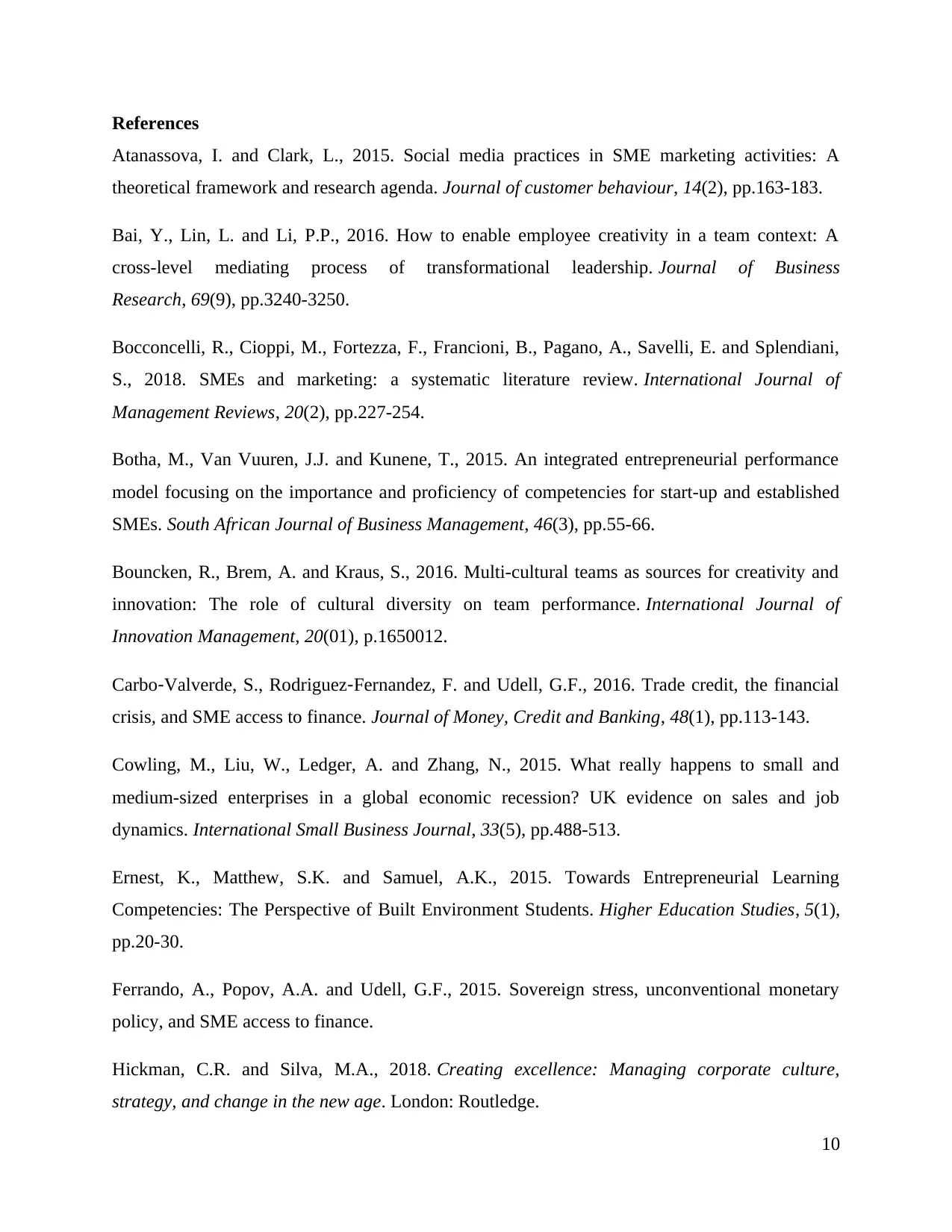
References
Atanassova, I. and Clark, L., 2015. Social media practices in SME marketing activities: A
theoretical framework and research agenda. Journal of customer behaviour, 14(2), pp.163-183.
Bai, Y., Lin, L. and Li, P.P., 2016. How to enable employee creativity in a team context: A
cross-level mediating process of transformational leadership. Journal of Business
Research, 69(9), pp.3240-3250.
Bocconcelli, R., Cioppi, M., Fortezza, F., Francioni, B., Pagano, A., Savelli, E. and Splendiani,
S., 2018. SMEs and marketing: a systematic literature review. International Journal of
Management Reviews, 20(2), pp.227-254.
Botha, M., Van Vuuren, J.J. and Kunene, T., 2015. An integrated entrepreneurial performance
model focusing on the importance and proficiency of competencies for start-up and established
SMEs. South African Journal of Business Management, 46(3), pp.55-66.
Bouncken, R., Brem, A. and Kraus, S., 2016. Multi-cultural teams as sources for creativity and
innovation: The role of cultural diversity on team performance. International Journal of
Innovation Management, 20(01), p.1650012.
Carbo‐Valverde, S., Rodriguez‐Fernandez, F. and Udell, G.F., 2016. Trade credit, the financial
crisis, and SME access to finance. Journal of Money, Credit and Banking, 48(1), pp.113-143.
Cowling, M., Liu, W., Ledger, A. and Zhang, N., 2015. What really happens to small and
medium-sized enterprises in a global economic recession? UK evidence on sales and job
dynamics. International Small Business Journal, 33(5), pp.488-513.
Ernest, K., Matthew, S.K. and Samuel, A.K., 2015. Towards Entrepreneurial Learning
Competencies: The Perspective of Built Environment Students. Higher Education Studies, 5(1),
pp.20-30.
Ferrando, A., Popov, A.A. and Udell, G.F., 2015. Sovereign stress, unconventional monetary
policy, and SME access to finance.
Hickman, C.R. and Silva, M.A., 2018. Creating excellence: Managing corporate culture,
strategy, and change in the new age. London: Routledge.
10
Atanassova, I. and Clark, L., 2015. Social media practices in SME marketing activities: A
theoretical framework and research agenda. Journal of customer behaviour, 14(2), pp.163-183.
Bai, Y., Lin, L. and Li, P.P., 2016. How to enable employee creativity in a team context: A
cross-level mediating process of transformational leadership. Journal of Business
Research, 69(9), pp.3240-3250.
Bocconcelli, R., Cioppi, M., Fortezza, F., Francioni, B., Pagano, A., Savelli, E. and Splendiani,
S., 2018. SMEs and marketing: a systematic literature review. International Journal of
Management Reviews, 20(2), pp.227-254.
Botha, M., Van Vuuren, J.J. and Kunene, T., 2015. An integrated entrepreneurial performance
model focusing on the importance and proficiency of competencies for start-up and established
SMEs. South African Journal of Business Management, 46(3), pp.55-66.
Bouncken, R., Brem, A. and Kraus, S., 2016. Multi-cultural teams as sources for creativity and
innovation: The role of cultural diversity on team performance. International Journal of
Innovation Management, 20(01), p.1650012.
Carbo‐Valverde, S., Rodriguez‐Fernandez, F. and Udell, G.F., 2016. Trade credit, the financial
crisis, and SME access to finance. Journal of Money, Credit and Banking, 48(1), pp.113-143.
Cowling, M., Liu, W., Ledger, A. and Zhang, N., 2015. What really happens to small and
medium-sized enterprises in a global economic recession? UK evidence on sales and job
dynamics. International Small Business Journal, 33(5), pp.488-513.
Ernest, K., Matthew, S.K. and Samuel, A.K., 2015. Towards Entrepreneurial Learning
Competencies: The Perspective of Built Environment Students. Higher Education Studies, 5(1),
pp.20-30.
Ferrando, A., Popov, A.A. and Udell, G.F., 2015. Sovereign stress, unconventional monetary
policy, and SME access to finance.
Hickman, C.R. and Silva, M.A., 2018. Creating excellence: Managing corporate culture,
strategy, and change in the new age. London: Routledge.
10
Paraphrase This Document
Need a fresh take? Get an instant paraphrase of this document with our AI Paraphraser
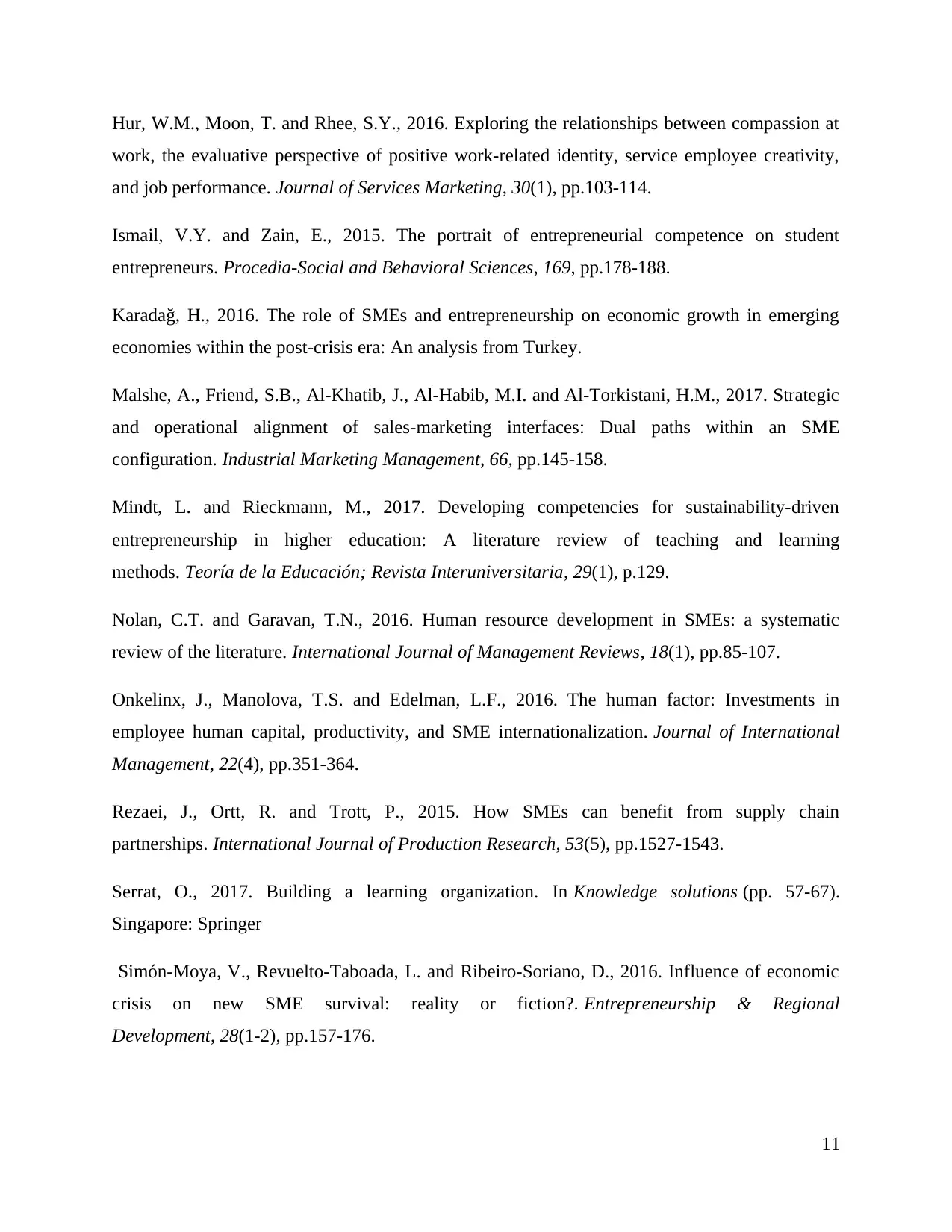
Hur, W.M., Moon, T. and Rhee, S.Y., 2016. Exploring the relationships between compassion at
work, the evaluative perspective of positive work-related identity, service employee creativity,
and job performance. Journal of Services Marketing, 30(1), pp.103-114.
Ismail, V.Y. and Zain, E., 2015. The portrait of entrepreneurial competence on student
entrepreneurs. Procedia-Social and Behavioral Sciences, 169, pp.178-188.
Karadağ, H., 2016. The role of SMEs and entrepreneurship on economic growth in emerging
economies within the post-crisis era: An analysis from Turkey.
Malshe, A., Friend, S.B., Al-Khatib, J., Al-Habib, M.I. and Al-Torkistani, H.M., 2017. Strategic
and operational alignment of sales-marketing interfaces: Dual paths within an SME
configuration. Industrial Marketing Management, 66, pp.145-158.
Mindt, L. and Rieckmann, M., 2017. Developing competencies for sustainability-driven
entrepreneurship in higher education: A literature review of teaching and learning
methods. Teoría de la Educación; Revista Interuniversitaria, 29(1), p.129.
Nolan, C.T. and Garavan, T.N., 2016. Human resource development in SMEs: a systematic
review of the literature. International Journal of Management Reviews, 18(1), pp.85-107.
Onkelinx, J., Manolova, T.S. and Edelman, L.F., 2016. The human factor: Investments in
employee human capital, productivity, and SME internationalization. Journal of International
Management, 22(4), pp.351-364.
Rezaei, J., Ortt, R. and Trott, P., 2015. How SMEs can benefit from supply chain
partnerships. International Journal of Production Research, 53(5), pp.1527-1543.
Serrat, O., 2017. Building a learning organization. In Knowledge solutions (pp. 57-67).
Singapore: Springer
Simón-Moya, V., Revuelto-Taboada, L. and Ribeiro-Soriano, D., 2016. Influence of economic
crisis on new SME survival: reality or fiction?. Entrepreneurship & Regional
Development, 28(1-2), pp.157-176.
11
work, the evaluative perspective of positive work-related identity, service employee creativity,
and job performance. Journal of Services Marketing, 30(1), pp.103-114.
Ismail, V.Y. and Zain, E., 2015. The portrait of entrepreneurial competence on student
entrepreneurs. Procedia-Social and Behavioral Sciences, 169, pp.178-188.
Karadağ, H., 2016. The role of SMEs and entrepreneurship on economic growth in emerging
economies within the post-crisis era: An analysis from Turkey.
Malshe, A., Friend, S.B., Al-Khatib, J., Al-Habib, M.I. and Al-Torkistani, H.M., 2017. Strategic
and operational alignment of sales-marketing interfaces: Dual paths within an SME
configuration. Industrial Marketing Management, 66, pp.145-158.
Mindt, L. and Rieckmann, M., 2017. Developing competencies for sustainability-driven
entrepreneurship in higher education: A literature review of teaching and learning
methods. Teoría de la Educación; Revista Interuniversitaria, 29(1), p.129.
Nolan, C.T. and Garavan, T.N., 2016. Human resource development in SMEs: a systematic
review of the literature. International Journal of Management Reviews, 18(1), pp.85-107.
Onkelinx, J., Manolova, T.S. and Edelman, L.F., 2016. The human factor: Investments in
employee human capital, productivity, and SME internationalization. Journal of International
Management, 22(4), pp.351-364.
Rezaei, J., Ortt, R. and Trott, P., 2015. How SMEs can benefit from supply chain
partnerships. International Journal of Production Research, 53(5), pp.1527-1543.
Serrat, O., 2017. Building a learning organization. In Knowledge solutions (pp. 57-67).
Singapore: Springer
Simón-Moya, V., Revuelto-Taboada, L. and Ribeiro-Soriano, D., 2016. Influence of economic
crisis on new SME survival: reality or fiction?. Entrepreneurship & Regional
Development, 28(1-2), pp.157-176.
11
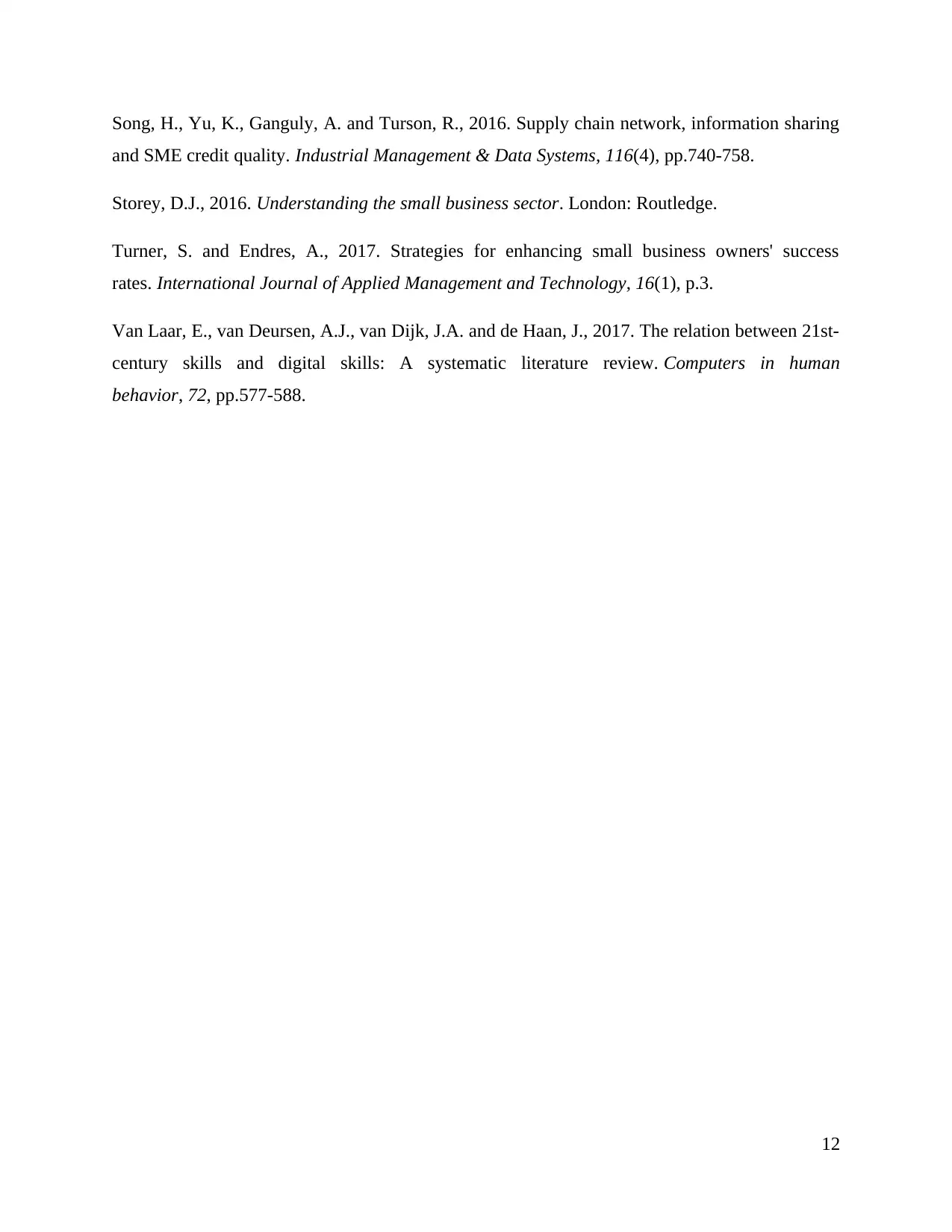
Song, H., Yu, K., Ganguly, A. and Turson, R., 2016. Supply chain network, information sharing
and SME credit quality. Industrial Management & Data Systems, 116(4), pp.740-758.
Storey, D.J., 2016. Understanding the small business sector. London: Routledge.
Turner, S. and Endres, A., 2017. Strategies for enhancing small business owners' success
rates. International Journal of Applied Management and Technology, 16(1), p.3.
Van Laar, E., van Deursen, A.J., van Dijk, J.A. and de Haan, J., 2017. The relation between 21st-
century skills and digital skills: A systematic literature review. Computers in human
behavior, 72, pp.577-588.
12
and SME credit quality. Industrial Management & Data Systems, 116(4), pp.740-758.
Storey, D.J., 2016. Understanding the small business sector. London: Routledge.
Turner, S. and Endres, A., 2017. Strategies for enhancing small business owners' success
rates. International Journal of Applied Management and Technology, 16(1), p.3.
Van Laar, E., van Deursen, A.J., van Dijk, J.A. and de Haan, J., 2017. The relation between 21st-
century skills and digital skills: A systematic literature review. Computers in human
behavior, 72, pp.577-588.
12
⊘ This is a preview!⊘
Do you want full access?
Subscribe today to unlock all pages.

Trusted by 1+ million students worldwide
1 out of 13
Related Documents
Your All-in-One AI-Powered Toolkit for Academic Success.
+13062052269
info@desklib.com
Available 24*7 on WhatsApp / Email
![[object Object]](/_next/static/media/star-bottom.7253800d.svg)
Unlock your academic potential
Copyright © 2020–2025 A2Z Services. All Rights Reserved. Developed and managed by ZUCOL.


